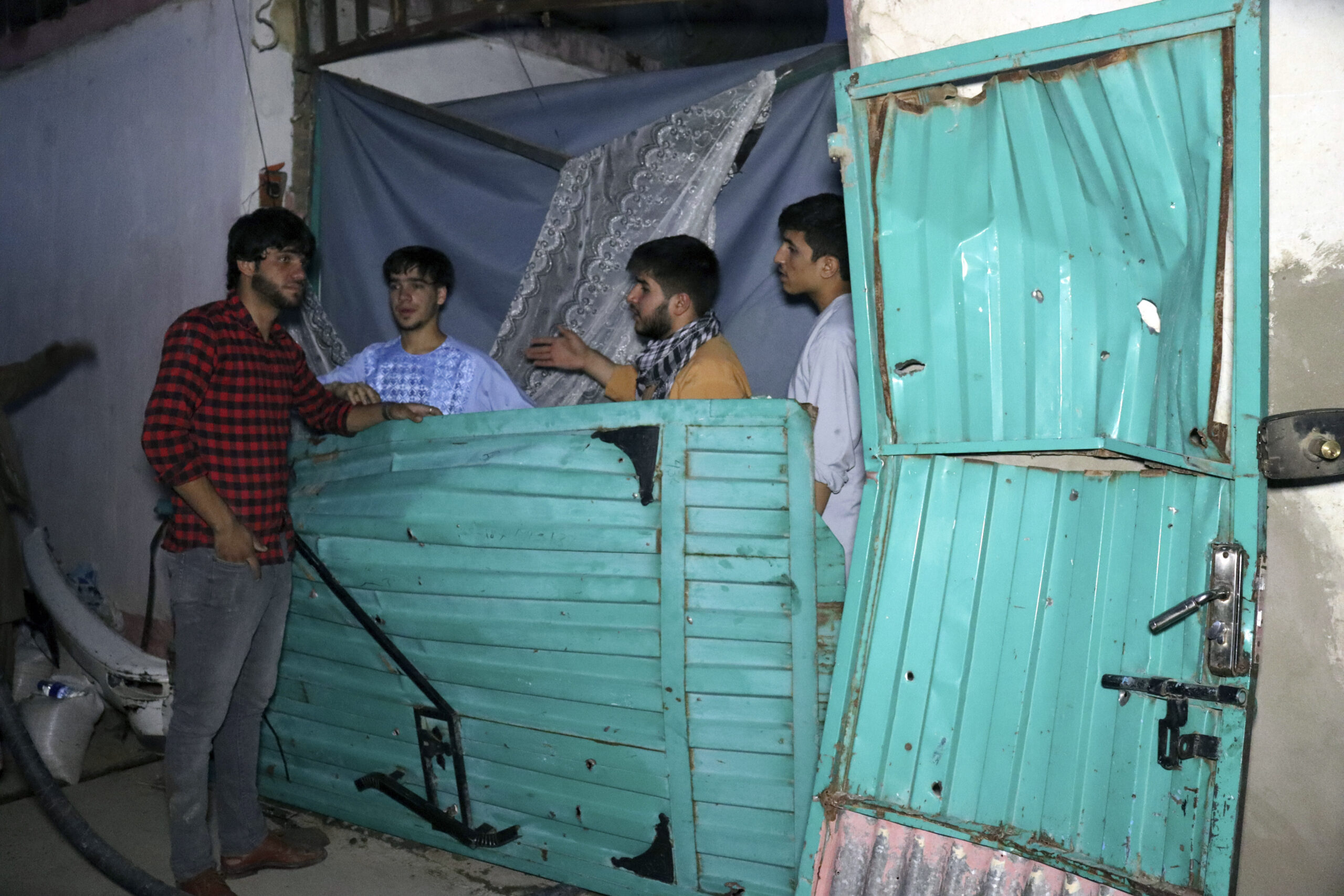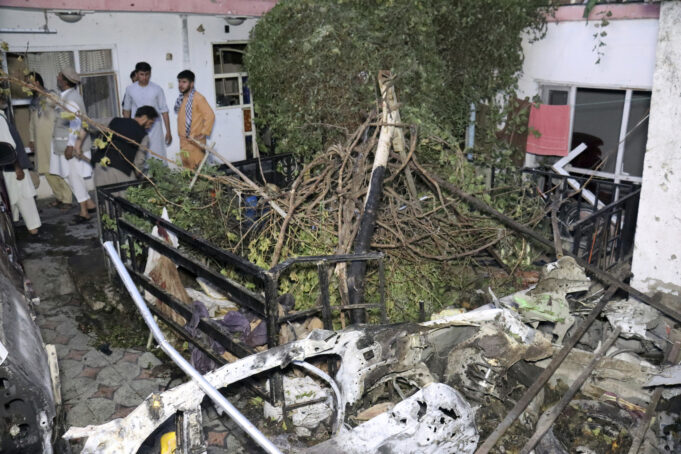“And every nation has a term; so when its term comes, they cannot remain behind the least while, nor can they precede (it).” —Holy Qur’an 7:34
America is deeply divided against itself and a troubled power on the world stage. Signs are becoming clearer that America is unraveling as the great empires of old crumbled. The Holy Qur’an, the scripture of Islam, says that “every nation has a term” and will be judged by its deeds.
In his monumental book, “The Fall of America,” the Most Honorable Elijah Muhammad, the Eternal Leader of the Nation of Islam, wrote about “America’s Dreaded Destiny,” her prophesized fall and why she is in decline as the world’s most formidable economic and military power.
“America has lived in peace—so far as foreign war is concerned, she has destroyed other peoples and their towns and cities,” wrote the Honorable Elijah Muhammad. And, he continued, America brags she has enough bombs and destructive weapons to destroy all human beings on the face of the earth, and still have armaments left.

“Of this she boasts. But Allah (God) has said to me that He will destroy America. He will bring her to her knees (humiliation),” said the Hon. Elijah Muhammad, as a warner to America and world nations.
He declared that America would not win another war during its conflict with Vietnam in the 1960s and 1970s. Since ending a 20-year war and occupation in Afghanistan in late August in defeat, America’s record and global stature is being weighed by analysts, observers and enemies.
It is also tearing at the fabric of a divided nation as politicians vie for party or personal advantage as opposed to finding national interest.
For two days, Sept. 28-29, the Senate Armed Services Committee held “Ending the U.S. Military Mission in Afghanistan” hearings to ascertain why the latter days of the war and U.S. exit went so badly, so fast.
“Did we have the right strategy? Did we have too many strategies?” rhetorically asked Lloyd Austin, the U.S. secretary of defense and first Black to hold the post.
Mr. Austin questioned whether “we put too much faith in our ability” to build effective Afghan institutions like an army, an air force, a police force, and government ministries.
“We helped build the state … but we could not forge a nation,” he admitted, while summarizing America’s time in Afghanistan.
Billions of American taxpayer dollars were dumped into propping up Afghan puppet regimes. The Afghan military was equipped with U.S. training and weapons but the force melted as fast as ice in a desert to rival Taliban forces, hardly firing a shot.
Gen. Mark Milley, chairman of the Joint Chiefs of Staff, told lawmakers America’s war loss, and the swift fall of Kabul was the result of bad decisions across multiple presidential administrations.
“It wasn’t lost in the last 20 days or even 20 months. There’s a cumulative effect to a series of strategic decisions that go way back,” said Gen. Milley.

Mr. Austin, Gen. Milley and Gen. Kenneth McKenzie, commander of the U.S. Central Command, were grilled in the contentious hearings. Some Republican lawmakers called for the Biden administration officials and military leaders to resign over the disastrous war finale.
The hasty exit, rife with mayhem and bloodshed, included the deaths of nearly 200 Afghans and 13 American service members killed in a suicide bomb attack outside the Hamid Karzai Airport. A U.S. retaliatory drone strike killed 10 innocent Afghans, including seven children in a Kabul neighborhood.
Withdrawal and airlift operations to remove Americans and Afghans who aided the foreign occupation were chaotic. The weeks that followed have been fraught with political scrambling and blame-shifting.
Senate Republicans pressed the military heads: Prior to the chaotic end did they advise President Biden to keep several thousand U.S. troops in Afghanistan to prevent the downfall of the U.S.-backed government and a rapid takeover by the Taliban? Republicans accused President Biden of lying when he told a television interviewer, he never received such advice.
Mr. Austin, and both Gen. Milley and Gen. McKenzie, refrained from divulging specific advice they gave the president. The two generals confirmed he was presented with opinions against drawing troop levels down to zero and for leaving 2,500 troops behind. The final decision, of course, remained with the president.
In a candid assessment of the military intervention that cost 2,461 American lives, killed 176,000 people and cost America her reputation and world friendship, Gen. Milley admitted the failure was a blow.
American “credibility with allies and partners around the world and with adversaries is being intensely reviewed by them to see which way this is going,” said Gen. Milley.
The war is not over
President Biden and U.S. officials have repeatedly claimed the Afghan airlift was a success, the largest air evacuation in history and got 124,000 people out of the country.
The military leaders repeated those talking points with a promise that global meddling and U.S. gangsterism would continue through “over-the-horizon” capability, which allows launching U.S. drone strikes on Afghan targets from other countries.
“There’s no tactic they weren’t willing to use to impose their domination on countries around the world,” commented Sara Flounders, co-founder of the New York-based International Action Center.
“They’re not just slipping on a banana peel,” she said, answering a Final Call question about U.S. global losses. “People in this day and age are not willing to be ruled by overmasters,” Ms. Flounders added.
Afghanistan resistance with no formal military whatsoever was able to defeat the U.S. “How was that possible? It just shows there was a level of resistance in the whole country,” she said.
“What the United States is hearing more and more is we’re not going to accept this colonial domination,” explained Ms. Flounders.
America’s deep internal divisions are also now fully exposed.
“I think unfortunately America is following the same path and pattern of a number of the other great empires that has come and gone before, whether its Greece, Rome, Ottoman, Britain,” said Dr. Wilmer Leon, a political scientist, author, and syndicated columnist.
Unbridled military expansion led to the downfall of many previous empires and America is falling victim to that same process and arrogance, he explained.
“Minister Farrakhan said, back when the United States was getting ready to go into Iraq, never underestimate the blindness that attends arrogance,” recalled Dr. Leon, referring to the Honorable Minister Louis Farrakhan of the Nation of Islam.

“He (Minister Farrakhan) said: ‘you don’t see with your eyes, you see with your heart and mind, and your arrogance blinds you to the realities that are right in front of you,’ ” Dr. Leon continued.
The Afghan aftershock includes the loss of $2 trillion spent over two decades, thousands of deaths among allied forces in a war theater where America was the lead actor, and a vulnerable region where potential war may continue.
Afghanistan borders Pakistan, China, Tajikistan, Uzbekistan, Turkmenistan, and Iran. The aftermath includes concerns about neighboring countries and fears of another Afghan civil war. A spokesman for the Afghan Interior Ministry said five people were killed in an Oct. 3 bomb blast outside a Kabul mosque. It was the deadliest attack in the Afghan capital since U.S. forces left. The roadside blast exploded at the gate of the sprawling Eid Gah Mosque while a memorial service was in progress for the mother of Taliban deputy-minister of information and spokesman Zabihullah Mujahid.
The explosion underscored the growing challenges the Taliban face just weeks after assuming control of Afghanistan.
Alongside worries about Taliban ability to control deadly anti-American rivals, the door is open for nontraditional alliances, particularly between the Taliban government and U.S. foes like China and Iran.
“The Taliban-dominated and devastated country left behind has clearly signaled it will not be used as a base to destabilize either China or Iran,” said Tim Anderson, author and director of the Sydney-based Centre for Counter-Hegemonic Studies in a Sept. 23 op-ed published on the Iranian Council for Defending the Truth website. “That is a further slap in the face for U.S. ambitions,” said Mr. Anderson.
Mr. Anderson predicts Afghanistan will pass through a difficult period while emerging from the 20-year war and occupation. “It has the good fortune of China’s offer of reconstruction assistance,” he wrote.
War making’s other implications
Shoring up the military industrial complex where defense companies wax rich at the expense of the country is a causative factor in the decline of America, said Dr. Leon.
“We could still be the shining city on the hill but we’ve chosen to invest our money in other places … into militarism,” Dr. Leon observed.
America prioritized pouring resources in war over taking care of the American people, he said. U.S. lawmakers were hotly debating an infrastructure bill that includes proposed money for roads, bridges and public transportation as well as “social infrastructure” like schools, universities, hospitals, prisons and public housing at Final Call presstime.
A divisive debate erupted over the proposed $3.5 trillion spending package, but America wasted an estimated $8 trillion to $9 trillion since first going into Afghanistan in 1979.
By mid-October the U.S. government reaches its borrowing limit, which could trigger a first-ever U.S. default and a self-inflicted economic crisis. It could delay federal payments like Social Security checks and monthly child tax credit payments. This is the domino effect, said analysts.
Ms. Flounders also pointed out how misdirected spending on war versus domestic needs caused a public distrust of the government. There is “real decay” because the decisions are for “what is profitable” not “what is needed,” she argued. “And it’s getting worse.”
Ms. Flounders believes even U.S. sanctions against other nations will eventually backfire as the affected countries forge alliances. Uniting to fill the gaps caused by the U.S. sanctions challenges Washington’s economic terrorism and includes secondary sanctions targeting shipping companies, third parties and clamping down on swap deals between nations.
The United States spends $750 billion on the annual National Defense Authorization Act, giving money to the military industrial complex while 40 million people face evictions in America. Where would the U.S. be if half the money going to defense was reinvested in the country?
Dr. Leon ridiculed arguments that hefty military spending keeps the U.S. safe. “Safe from what?” he retorted. “We have to be safe from the threats that we’re creating. We invaded Iraq, Afghanistan, we underwrote the battle in Syria, for no reason.”
The U.S. targets leaders and destabilizes nations, with Iran, Syria, Venezuela, Cuba, Nicaragua and Haiti among countries in her sights. If America stopped these aggressive, interventionalist actions, the world would be safer, and the U.S. would have more money to reinvest at home, analysts argued. But can the country change her ways and come back?
“America is in decline, and news flash—it ain’t coming back,” predicted Dr. Leon.













